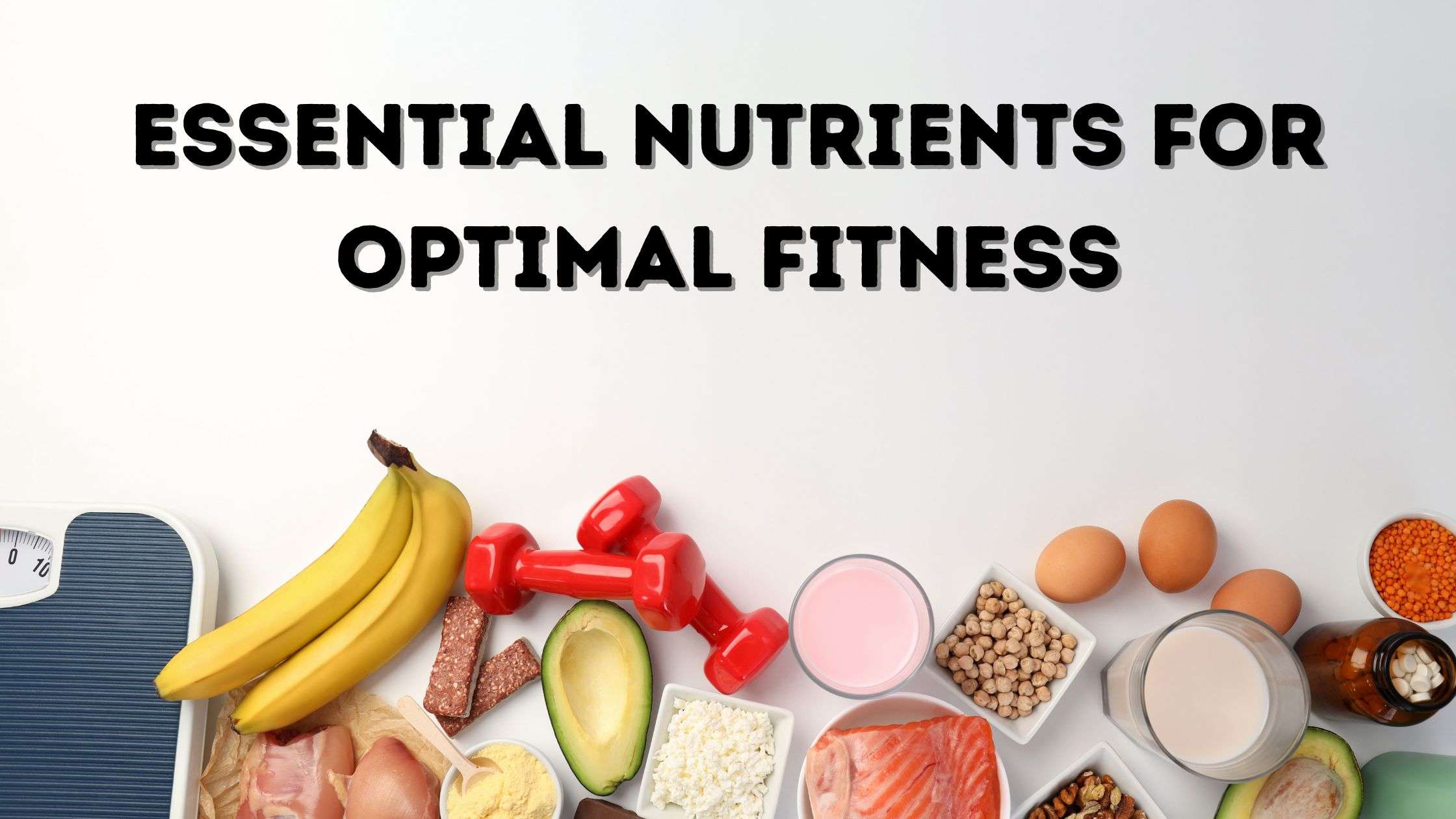Currently Empty: ₹0.00

Introduction
Definition of Essential Nutrients Essential nutrients are compounds that the body cannot synthesize in sufficient quantities and must be obtained from the diet. These include macronutrients (proteins, carbohydrates, fats), micronutrients (vitamins, minerals), and water, all of which are critical for maintaining health and supporting fitness.
Importance for Optimal Fitness For optimal fitness, a balanced intake of essential nutrients is crucial. They provide the energy needed for physical activity, aid in muscle repair and growth, support metabolic functions, and ensure overall well-being. Adequate nutrition helps maximize performance and recovery, making it a cornerstone of any fitness regimen.
Overview of Key Nutrients The key nutrients vital for fitness include proteins for muscle repair, carbohydrates for energy, fats for hormone production, vitamins and minerals for various metabolic processes, and water for hydration. Each plays a unique role in enhancing physical performance and maintaining health.
Types and Categories of Essential Nutrients
Macronutrients Macronutrients are the primary nutrients required in large amounts for energy and bodily functions.
- Proteins: Crucial for muscle repair and growth.
- Carbohydrates: The main energy source for physical activities.
- Fats: Essential for energy storage and hormone production.
Micronutrients Micronutrients, although needed in smaller quantities, are vital for numerous physiological functions.
- Vitamins: Organic compounds essential for metabolism and immunity.
- Minerals: Inorganic elements critical for bone health, muscle function, and hydration.
Water and Hydration Water is essential for life, aiding in digestion, nutrient transport, temperature regulation, and overall cellular function.
Proteins
Role in Muscle Building and Repair Proteins are composed of amino acids, which are the building blocks of muscle tissue. They are essential for repairing muscle fibers damaged during exercise and promoting muscle growth.
Sources of Protein
- Animal-Based Proteins: Include meats, poultry, fish, eggs, and dairy. These sources provide complete proteins containing all essential amino acids.
- Plant-Based Proteins: Include beans, lentils, tofu, nuts, and seeds. While some plant proteins may lack certain amino acids, combining different sources can ensure a complete amino acid profile.
Daily Protein Requirements Protein needs vary based on activity level, age, and overall health. For fitness enthusiasts, a common recommendation is 1.2 to 2.2 grams of protein per kilogram of body weight per day to support muscle maintenance and growth.
Carbohydrates
Role in Energy Production Carbohydrates are the body’s preferred source of energy, especially during high-intensity exercise. They are broken down into glucose, which fuels muscle contractions.
Types of Carbohydrates
- Simple Carbohydrates: Include sugars found in fruits, milk, and processed foods. They provide quick energy but can lead to rapid blood sugar spikes.
- Complex Carbohydrates: Found in whole grains, legumes, and vegetables. They provide sustained energy and are rich in fiber, aiding in digestion and satiety.
Sources of Carbohydrates
- Whole Grains: Such as oats, brown rice, quinoa, and whole wheat.
- Fruits and Vegetables: Provide vitamins, minerals, and fiber along with carbohydrates.
Glycemic Index and Fitness The glycemic index (GI) measures how quickly foods raise blood sugar levels. Low-GI foods provide sustained energy, while high-GI foods can be beneficial for quick energy replenishment post-exercise.
Fats
Role in Hormone Production and Energy Storage Fats are essential for hormone production, brain health, and long-term energy storage. They help in absorbing fat-soluble vitamins (A, D, E, and K).
Types of Fats
- Saturated Fats: Found in animal products and certain oils. Should be consumed in moderation.
- Unsaturated Fats: Include monounsaturated and polyunsaturated fats found in avocados, nuts, seeds, and fish oils. These fats are beneficial for heart health.
Sources of Healthy Fats
- Avocados: Rich in monounsaturated fats and fiber.
- Nuts and Seeds: Provide essential fatty acids and protein.
- Fish Oils: High in omega-3 fatty acids, important for reducing inflammation and supporting cardiovascular health.
Vitamins
Importance of Vitamins for Fitness Vitamins are essential for energy production, immune function, and the prevention of oxidative damage.
Key Vitamins for Athletes
- Vitamin D: Supports bone health and immune function. Found in fatty fish, fortified foods, and sunlight exposure.
- Vitamin C: Important for collagen synthesis, immune health, and antioxidant protection. Found in citrus fruits, berries, and vegetables.
- B Vitamins: Aid in energy production and red blood cell formation. Found in whole grains, meat, and dairy products.
Sources of Vitamins
- Food Sources: A balanced diet rich in fruits, vegetables, whole grains, and lean proteins.
- Supplements: Can be used to fill dietary gaps, especially in individuals with specific deficiencies or higher nutrient demands.
Minerals
Importance of Minerals for Fitness Minerals are involved in numerous physiological processes, including muscle contraction, nerve function, and hydration.
Key Minerals for Athletes
- Calcium: Essential for bone health and muscle function. Found in dairy products, leafy greens, and fortified foods.
- Iron: Crucial for oxygen transport in the blood. Found in red meat, poultry, beans, and fortified cereals.
- Magnesium: Supports muscle function and energy production. Found in nuts, seeds, whole grains, and leafy greens.
- Zinc: Important for immune function and protein synthesis. Found in meat, shellfish, legumes, and seeds.
Sources of Minerals
- Food Sources: A varied diet that includes a mix of animal and plant-based foods.
- Supplements: Can help address deficiencies and support increased demands due to intense physical activity.
Water and Hydration
Importance of Hydration Water is vital for maintaining body temperature, removing waste, and ensuring overall cellular function. Proper hydration enhances performance and recovery.
Signs of Dehydration Common signs include thirst, dry mouth, dark urine, fatigue, dizziness, and decreased performance. Severe dehydration can lead to serious health issues.
Hydration Strategies for Athletes
- Pre-Workout Hydration: Ensuring adequate fluid intake before exercise.
- During Workout Hydration: Drinking small amounts regularly during physical activity.
- Post-Workout Hydration: Replenishing lost fluids and electrolytes after exercise.
